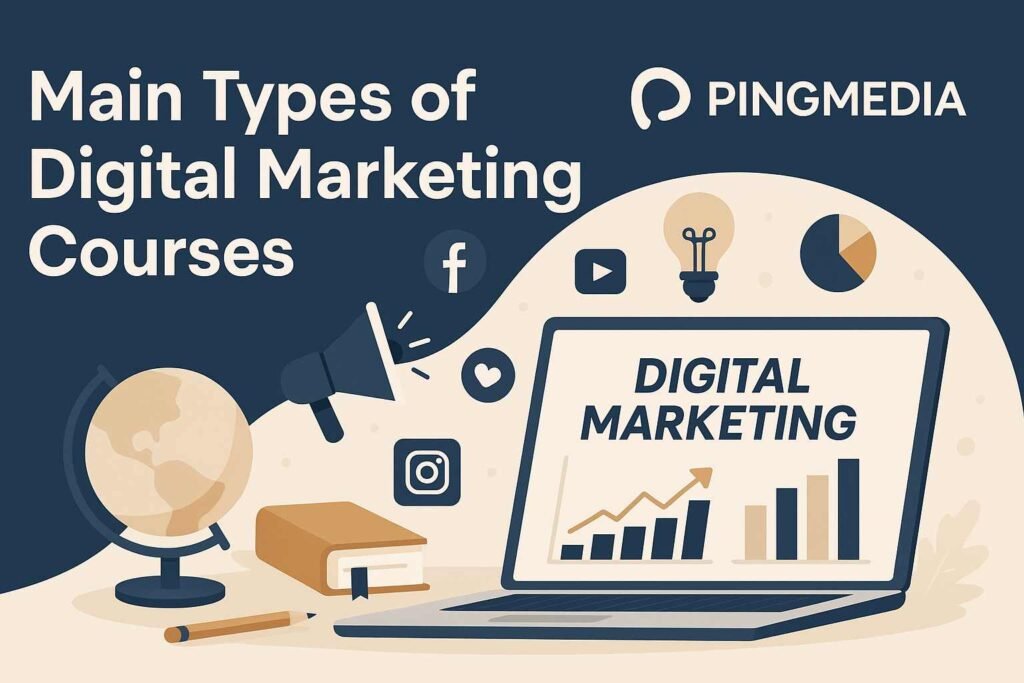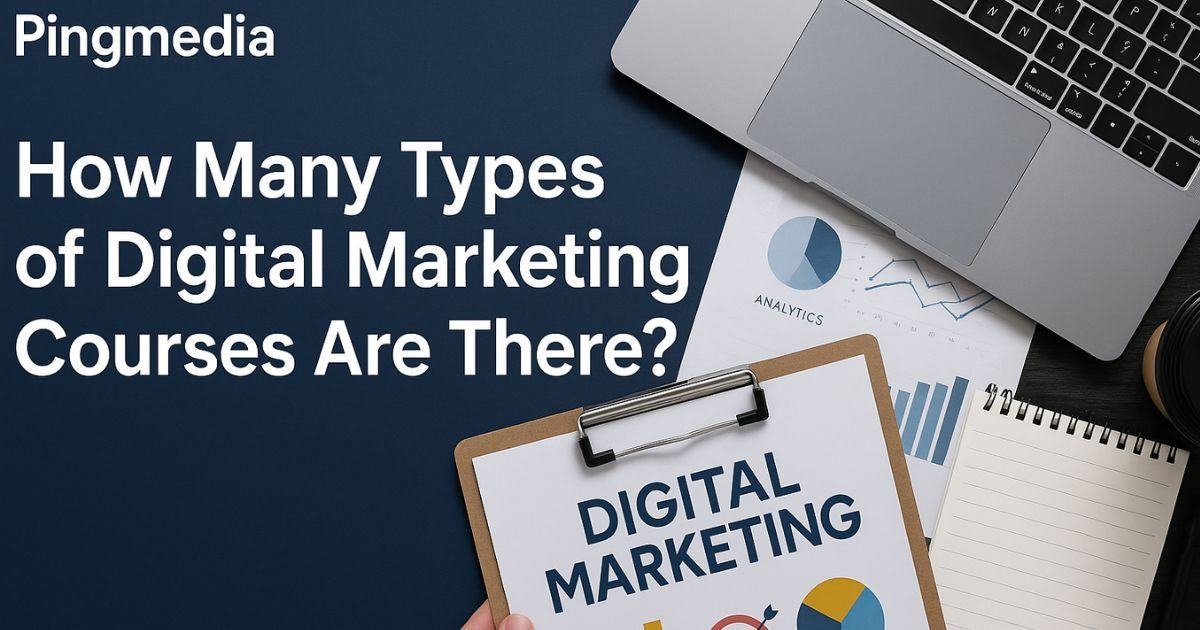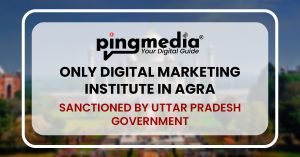Introduction
Digital Marketing is the backbone of modern business growth. With more companies shifting online, the demand for skilled digital marketers has skyrocketed. But with so many course options available, how do you know which type of digital marketing course is right for you? In this comprehensive guide by Pingmedia, we’ll break down the main types of Digital Marketing Courses, what they cover, who they’re for, and how to choose the best path for your career.
What Is Digital Marketing?
Digital marketing refers to all marketing efforts that use the internet or electronic devices. Businesses leverage channels such as search engines, social media, email, and websites to connect with current and prospective customers. As the digital landscape evolves, so does the need for specialized knowledge—making digital marketing courses more essential than ever.
Why Take a Digital Marketing Course?
- Stay Competitive: The digital world changes fast. Courses keep your skills current.
- Boost Career Prospects: Certified digital marketers are in high demand.
- Gain Practical Skills: Learn hands-on tools and strategies used by top brands.
- Flexible Learning: Online, offline, short-term, and advanced options are available for every learner.
Main Types of Digital Marketing Courses

There are many ways to categorize Digital marketing courses. The most common distinctions are:
- By subject area (e.g., SEO, social media, analytics)
- By format (online, offline, hybrid)
- By depth (beginner, advanced, specialization)
- By certification or degree
Let’s explore each in detail.
1. Subject-Based Digital Marketing Courses
These courses focus on specific areas within digital marketing. Here are the most popular types:
| Course Type | What You Learn | Who It’s For |
| Search Engine Optimization (SEO) | Website optimization, keyword research, link building, on-page/off-page SEO | Marketers, webmasters |
| Pay-Per-Click (PPC) Advertising | Google Ads, campaign setup, bidding, ad copywriting, analytics | Advertisers, business owners |
| Social Media Marketing | Strategy, content creation, platform management, paid ads | Social media managers |
| Content Marketing | Blogging, video, infographics, storytelling, content strategy | Content creators, marketers |
| Email Marketing | List building, campaign design, automation, deliverability | CRM, sales, marketers |
| Analytics & Data | Google Analytics, KPIs, reporting, data-driven decisions | Analysts, strategists |
| Mobile Marketing | Mobile ads, app marketing, SMS, responsive design | App developers, marketers |
| Affiliate & Influencer Marketing | Partner programs, influencer outreach, tracking, compliance | Entrepreneurs, marketers |
2. Format-Based Digital Marketing Courses
Digital marketing courses come in various formats to suit different learning preferences and schedules.
| Format | Description | Pros | Cons |
| Online | Self-paced or live classes via platforms like Coursera, Udemy, Pingmedia | Flexible, global access | Less networking |
| Offline | In-person classes at institutes or universities | Hands-on, networking | Fixed schedule, location |
| Hybrid | Mix of online and offline learning | Best of both worlds | May cost more |
| Workshops | Short, intensive sessions on specific topics | Quick skill boost | Limited depth |
| Bootcamps | Intensive, immersive programs (often project-based) | Fast learning, job-ready | Demanding, time-intensive |
3. Level-Based Digital Marketing Courses
Courses are often structured according to the learner’s experience level:
- Beginner: Covers fundamentals like digital marketing basics, introduction to SEO, social media, and analytics.
- Intermediate: Dives deeper into strategy, campaign management, and specialized tools.
- Advanced: Focuses on advanced analytics, automation, AI in marketing, and leadership skills.
- Specializations: Targeted expertise in areas like e-commerce, B2B marketing, or influencer marketing.
4. Certification & Degree Courses
| Course Type | Duration | Recognition | Example Providers |
| Short-term Certificate | 1 week – 3 months | Certificate of completion | Pingmedia, Coursera, Udemy |
| Professional Certificate | 3 – 6 months | Industry-recognized certificate | Google, Meta, HubSpot |
| Diploma | 6 months – 1 year | Diploma | Institutes, colleges |
| Degree (Bachelors/Masters) | 1 – 2 years | Academic degree | Universities |
| Postgraduate/Executive | 6 months – 1 year | Advanced diploma/degree | Business schools, universities |
What Does a Comprehensive Digital Marketing Course Cover?
A full-fledged digital marketing course typically includes:
- Introduction to Digital Marketing: Principles, digital vs. traditional, customer journey.
- Core Modules: SEO, PPC, social media, content, email, analytics, mobile marketing.
- Strategy & Planning: Building campaigns, setting goals, budgeting, optimization.
- Ethics & Compliance: Data privacy, ethical marketing, legal guidelines.
- Practical Assignments: Real-world projects, campaign simulations, tool usage.
- Tools & Software: Google Analytics, SEMrush, MailChimp, Canva, Hootsuite, Google Ads, Meta Ads Manager.
Popular Digital Marketing Course Topics
Here’s a quick overview of the most in-demand topics:
| Topic | Description |
| Inbound Marketing | Attracting customers via content, SEO, and social media |
| Outbound Marketing | PPC, display ads, and direct outreach |
| Influencer Marketing | Partnering with social media influencers |
| Marketing Automation | Using software to automate repetitive marketing tasks |
| Data Analytics | Measuring, analyzing, and optimizing campaign performance |
| E-commerce Marketing | Strategies for online stores, product listings, and conversion optimization |
How to Choose the Right Digital Marketing Course
1. Define Your Goals:
Do you want a broad overview or specialize in one area? Are you looking for a quick upskill or a full career change?
2. Check Course Content:
Look for updated syllabi that cover current tools, trends, and compliance topics1.
3. Consider Format and Duration:
Pick a format that fits your schedule and preferred learning style.
4. Verify Credentials:
Choose courses from reputable providers like Pingmedia, Google, Meta, or accredited universities.
5. Look for Practical Experience:
Courses with real-world projects and tool training offer the best learning outcomes.
Top Digital Marketing Courses in 2025
Here are some popular options to consider:
| Course Name | Provider | Key Focus Areas | Level |
| Google Digital Marketing & E-commerce | SEO, SEM, e-commerce, analytics | Beginner | |
| Meta Social Media Marketing | Meta | Social media, paid ads, content creation | Beginner |
| Digital Marketing Specialization | University of Illinois | Analytics, strategy, content, advertising | Intermediate |
| Digital Marketing Trends | Coursera | Latest trends, campaign management | Beginner |
| Pingmedia Digital Marketing Bootcamp | Pingmedia | Comprehensive, hands-on, job-ready skills | All levels |
Why Trust Pingmedia’s Expertise?
At Pingmedia, we combine years of hands-on digital marketing experience with a passion for teaching. Our instructors are seasoned professionals who have managed campaigns for leading brands. We stay updated with the latest trends, tools, and compliance requirements to ensure our courses are always relevant and practical.
We believe in learning by doing. Every Pingmedia course includes real-world assignments, live case studies, and access to industry-standard tools. Our alumni have gone on to build successful careers in digital marketing across various industries.
Conclusion:
The best course depends on your goals, background, and preferred learning style. If you’re just starting, a broad beginner course is ideal. If you want to specialize, choose a focused subject-based course. For those seeking recognized credentials, opt for a professional certificate or diploma.
At Pingmedia, we’re committed to helping you succeed in the digital world. Explore our range of digital marketing courses at Pingmedia and start your journey to becoming a digital marketing expert today!
Frequently Asked Questions
Q1: Can I learn digital marketing online?
Absolutely. Many leading providers—including Pingmedia—offer flexible online courses that cover everything from basics to advanced strategies2.
Q2: How long does it take to complete a digital marketing course?
It varies. Short workshops can be completed in a few days, while comprehensive diplomas or degrees may take up to two years.
Q3: Do I need a technical background?
No. Most courses are designed for beginners and teach all necessary technical skills from scratch.
Q4: Will I get a job after completing a course?
While no course can guarantee a job, completing a reputable digital marketing course significantly boosts your employability and skill set.
Ready to level up your career? Choose Pingmedia for expert-led, practical, and up-to-date digital marketing courses tailored to your needs
You may also Like : Digital Marketing Course Syllabus 2025 , Agra Students! Learn Digital Marketing & Start Earning Today





